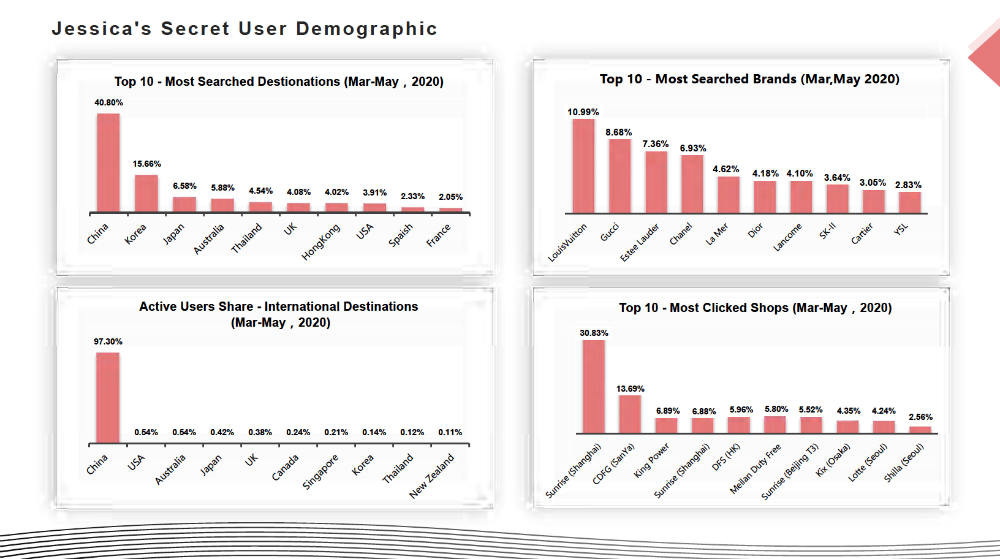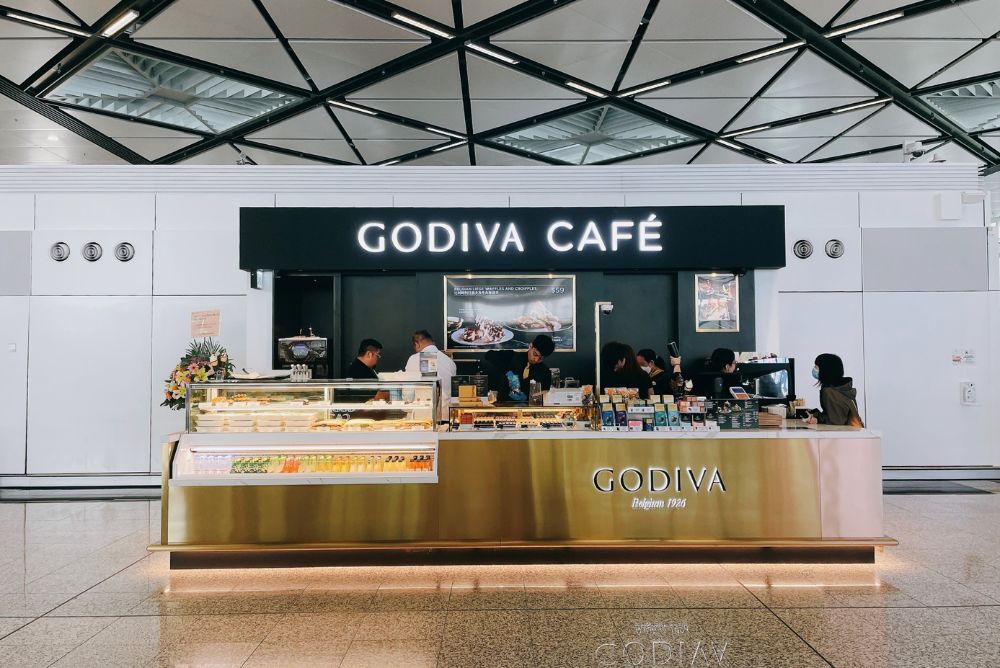‘New normal’ already old in China’s Covid recovery
By Luke Barras-hill |

TRConnect’s latest webinar deconstructed the buying behaviours and habits of Chinese travellers in a post-Covid world.
DF&TR has a priceless opportunity to properly exploit the data it captures while amplifying digital marketing strategies aimed at Chinese travellers through social media and live streaming channels.
These were headline takeaways surfacing in the latest TRConnect webinar, held by TRBusiness today (30 June) at 14:00 CET [to watch a repeat of the webinar, click below].
Themed, ‘Chinese travellers: The Much Anticipated Return’, the highly immersive session examined new business opportunities in the Chinese duty free market and shone the light on emerging marketing concepts reaching Chinese travellers in a post-Covid-19 world.
Co-hosted by TRBusiness Editorial Director Charlotte Turner and Head of Events and CSR Michael Barrett, the webinar featured an experienced and influential crop of speakers.
To download presentations from each of the panellists, click the relevant links below:
Stephie Yang, Jessica’s Secret
Sienna Parulis-Cook, Dragon Trail Interactive
CNSC’s Evita Qu did not have a PDF presentation. However, those who wish to contact her directly can do so here: [email protected]
ALMOST FOUR FIFTHS WILL TRAVEL BY AIR
More than 700 travel retail stakeholders registered for this edition of TRConnect, with hundreds tuning in for the live broadcast, which was held for the first time using Zoom.
Webinar attendees were treated to presentations and riveting panel discussions with Anna Marchesini, Head of Business Development, m1nd-set; Evita Qu, Deputy General Manager, China National Service Corporation for Chinese Personnel Working Abroad (CNSC); Anson Bailey, Head of Consumer & Retail Asia Pacific, KPMG; Stephie Yang, Head of Business Development, Jessica’s Secret; and Sienna Parulis-Cook, Associate Director of Communications, Dragon Trail Interactive.
In customary fashion, m1nd-set’s Marchesini kicked off proceedings by presenting the Swiss research company’s latest data – exclusive to TRBusiness – on Chinese travellers who continue to adjust to a new world order.
The online research was conducted on 1-15 June this year among m1nd-set’s database of international travellers (including Chinese flying for business and leisure, plus frequent and occasional travellers across all age groups).
They were recruited at more than 60 airports worldwide, having flown at least twice in the past 12 months and visited a travel retail store at least once during this period.
Marchesini began by stressing the relevance of understanding the habits of future Chinese shoppers in a post-Covid-19 society.

The latest topline analytics on Chinese traveller preferences (pictured and below) disclosed by Anna Marchesini of m1nd-set paints an encouraging picture for global travel retail on the resumption of international flights.
To put this in context, the profile of Chinese shoppers in a post-Covid world is heavily slanted toward millennials or those aged 18-35 years (70%), with a little over half (51%) being male.
Akin to previous intelligence revealed by m1nd-set, it is well established that Covid-19 has profoundly impacted household incomes with more than two thirds of Chinese shoppers (69%) admitting their disposable household monthly incomes have been negatively impacted by the crisis.
What has emerged, perhaps unilaterally across the globe too, is Chinese travellers are dedicating more time to family. Travellers are also engaging with social media, cooking, purchasing more products online, buying more environmentally friendly products, and indulging in content posted by celebrities or influencers.
In another show of confidence for the travel retail industry and one that will undoubtedly be greeted favourably, nearly four fifths (78%) of Chinese travellers would consider travelling by air within the first six months once international travel bans are lifted.
However, the indications show a shift in travel frequencies. An overwhelming number (83%) stated they would reduce their trips, of which a good amount (38%) revealed they would cut back on business and leisure/holiday excursions.
When it came to trip plans specifically, more than half (63%) of Chinese travellers said they would change planned international air trips due to Covid-19, with the US and England topping a list of most-avoided countries.
CHINESE WILL KEEP VISITING DF SHOPS
Another fillip revealed by Marchesini related to duty free shop visits and footfall in a post Covid-19 world.
Importantly, fewer than one fifth of Chinese travellers (15%) said they would not consider visiting duty free shops on future international air trips.
The top five product categories that Chinese are most likely to continue purchasing (in descending order of importance) were tobacco, skincare, makeup, souvenirs and gift items.
The data then gravitated towards Chinese engagement with airport duty free services in a post Covid-19 environment.
Among the least impacted airport services (in descending order of importance) were duty free shops, take-away outlets, airline lounges, currency exchange and multi-brand shops.
Perhaps unsurprisingly given heightened sensitivities around physical contact, the most affected areas were children’s playgrounds, massage/relaxation areas, exhibits or stands, fast food outlets and pop-up stores/brand activations. The barometer was those who would engage at the same level or more with the services.
Moving to experiential retail, Marchesini revealed that more than three fifths (65%) of Chinese shoppers would refrain from being in proximity with retail ambassadors/sales staff in the duty free shop.
Of that percentage, more than half (58%) said they would take precautions if they had to interact, with only a single-digit amount of travellers (7%) avoiding interaction altogether.
But not even two fifths (37%) of Chinese shoppers said they would refrain from testing products in the shop; one quarter (25%) would test items if necessary and only a fraction (8%) would avoid testing at all.
Contrary to a prevailing trend that has pushed retailers towards emphasising their click and collect services, a smaller proportion (25%) of Chinese travellers indicated they would be more likely to shop online and collect items upon boarding in arrivals with well under one quarter (11%) opting to use the facilities for most of their purchases.
In a segment on the inflight experience in a post-Covid world, fewer than half (40%) said they would be more concerned about the hygiene of seats and almost half (48%) would take more notice on the hygiene of the inflight entertainment after Covid-19.
Of that percentage – and interesting to note – a similar number of travellers would use their own personal entertainment devices (19%) as those who would opt to clean the inflight IFE before using it (18%).
Chinese are more likely, compared with other populations, to be concerned about hygiene of eating (48%) and are concerned about the hygiene of inflight magazines and press (32%).
In other inflight findings, nearly four fifths (78%) of Chinese travellers would feel safe and reassured by airline staff wearing masks – significantly higher than the global average, indicated m1nd-set.
“As Chinese are the first ones travelling, we need to learn and understand they are a different type of consumer due to the Covid-19 outbreak. We think retailers and brands need to review their strategies to better capitalise on human touchpoints. There will be a much stronger emphasis on digital and data-driven marketing.”
Before shifting to the next presentation, TRBusiness’ Barrett reminded webinar attendees to ensure they pre-register to attend the TRMarketplace digital forum, which takes place on 28 September – 2 October.
TRBusiness has been delighted by the wave of reaction to TRMarketplace, with more brands and retailers joining the networking platform every day ahead of its commencement during what would have been TFWA Cannes week – the most important summit of the business calendar [for more information and to register, click here. TRBusiness is also pleased to announce the launch of a dedicated website for TRMarketplace, which can be accessed here].
MASSIVE BOOST FOR HAINAN
In an insight-rich presentation, Stephie Yang of Jessica’s Secret – the global luxury price comparison app that has enjoyed stratospheric success in recent years – presented webinar guests with a uniquely placed view of China and how it has responded to Covid-19.
Drawing on data from Oriental Travel Retail Observer, Yang shared international and domestic arrival and departure metrics pointing to the significant drop in passenger traffic in May.
China’s international flight policy, dubbed ‘five ones’ (one airline, one country, one route, one week, one flight) was introduced at the end of March and is expected to continue into July.

TRBusiness has hosted three TRConnect webinars to date. All have been watched [either live or via recording] by at least 1,000 executives across the global DF&TR industry.
The view of international flights to major destinations makes for sobering reading. In May, Chinese travellers made a mere 5,500 and 3,700 international departure trips from Shanghai and Beijing Airports, respectively.
In terms of demographics, two million travellers aged 30-39 years took international flights from China in May last year, yet this plummeted to 22,000 in May 2020.
Notwithstanding this, the picture for domestic flights is far more rosy. After shedding light on numbers that continue to creep up, Yang turned her attention to Hainan.
As reported by TRBusiness, the Chinese government has more than tripled the duty free and tax free purchase allowance to RMB100,000 in a massive boost to the country’s already burgeoning industry. The allowance hike kicks in tomorrow [watch out for further, exclusive coverage on TRBusiness.com – Ed].
The developments in Hainan dovetail with concerted moves by China to stimulate Chinese travel retail, with Wangfujing Group the latest operator to be granted a licence to sell duty free products and more licences are expected to follow.

China has suffered a powerful shock to its usually vociferous travel eco-system but domestic trips are beginning to revive, as Jessica Secret’s Stephie Yang describes.
In the meantime, the sky has become murkier due to sudden outbreaks of Covid-19, particularly in Northeast China and in Beijing with new cases confirmed this month at the Beijing Xinfadi wholesale market.
“We predict the virus will be with us for a long time; it’s really unpredictable,” commented Yang.
In the first quarter of this year, Yang said the number of OTAs (online travel agencies) suffered due Covid-19’s devastating scourge on the travel sector.
For Jessica’s Secret, total users have declined by 57% in the last six months, revealed Yang. Most of the pre-Covid focus was on app modelling, but that has now shifted to data analysis as the pandemic continues to maul different regions.
FASHION/SKINCARE BUYING CUES
Next, Yang presented some interesting data on Jessica Secret’s users, the majority of which (72%) are females. Four fifths (80%) of the app’s users are millennials.
Between March and May, the most searched brands on the app were Louis Vuitton (10.99%), Gucci (8.68%) and Estée Lauder.
The heaviest share of users came from China (97.3%) and the most clicked shop destinations included Sunrise Duty Free in Shanghai (30.83%), CDFG Sanya (13.69%) and King Power (6.89%).
In a telling revelation that will prick the ears of retailers and suppliers alike, a good chunk of app users were interested in bags (40%) and beauty care products (38%), chiefly skincare rather than makeup.
Yang then presented Jessica Secret’s AITracking platform, allowing users to compare retail prices. The data covers over 60 regions and 980 shops, from duty free and department stores to official brand sites and T Mall.
Offers, promotions and campaigns on the platform act ‘as valuable reference for marketing campaigns and pricing strategies’, said Yang.
Jessica’s China Media Monitoring Platform also allows users to review the efficacy of major media platforms, info and data, allowing users to extract first-hand information on shops’ pricing levels in comparison with the global markets.
In a final slide, Yang presented ‘Jessica the Elf’, a price grading system that gives users references and recommendations on SKUs in different destinations. The score is calculated according to a grading algorithm model.
CHINA-SPECIFIC STRATEGIES ‘LACKING’
As Yang’s presentation wrapped up, webinar attendees were invited to take part in a firmly established tradition of the TRConnect webinars – interactive polling sessions.
Attendees were asked if they had a China-specific digital marketing strategy for digital communications through online platforms. Almost half the respondents (42%) revealed they did not.
A similar percentage (43%) revealed they did not have a China-specific digital marketing strategy for digital in-store activations/advertising etc.
Continuing with a firm tilt towards the situation on the ground in China, TRBusiness’ Charlotte Turner then quizzed Evita Qu of CNSC about current trading conditions and how the business has been affected by Covid-19.
Qu said: “With the outbreak of Covid-19 travel retail is definitely one of the hardest hit industries, especially the sharp decline in the number of international travellers.
“The Chinese authorities and people have worked with impressive discipline and responsibility and the epidemic situation is effectively under control and we can see a sustainable recovery in the economy. Thanks to the resilient business model and advantages of our downtown duty free stores, we have received more attention from loyal customers in traditional duty free stores. This helped us to recover. Meanwhile the sales performance of our stores has been climbing steadily since March.”
Indeed, most of CNSC’s stores are operational, although its port store at Tianjin remains shut.
CNSC reiterated to TRBusiness in an exclusive interview earlier this year that the Chinese company fully intends to open new downtown shops in locations such as Beijing and Qingdao, despite the prevailing situation [for an in-depth interview, see the May print edition of TRBusiness] and repeated those comments again.
Qu also said work is continuing on CNSC’s new downtown Beijing arrivals store.
She maintains that China is taking the lead in the economic recovery, supported through policies executed by central government. New measures have been released since March, including programmes to stimulate and widen the downtown duty free shop network.
CNSC FLOURISHES AS PURCHASE ELIGIBILITY TWEAKED
“I am very glad to share that the government has also issued a new policy allowing the extension of the validity of purchase qualifications at CNSC downtown stores. This means Chinese travellers who have returned from abroad between August 1 2019 and 1 June 2020 are eligible to buy duty free products in our stores at the end of this year.
“Previously, you must buy within 180 days after you returned home. This directly reflects the attitude of the government in developing downtown stores.”
Aside strict hygiene protocols at its downtown stores, including stringent disinfection regimes and mandatory mask wearing, Qu said: “We have carried out a number of innovative measures to ensure the safety of our customers while building customer engagement.

Hainan Island’s increased duty free allowance, effective 1 July, and further licence approvals on the Mainland were the subject of discussion. Click to enlarge.
“We’ve actively built customer communication channels, deepening online marketing practices. All our downtown stores have established online communications through multiple channels.”
Qu said the stores advertise on WEChat Moments and work with KOLs (key opinion leaders) on platforms such as TikTok to stream videos to attract customers to spend online.
“Some of our stores have started an online reservation and customer pick-up service,” said Qu. “We’ve made full use of the holiday consumption time to carry out marketing activities.”

“The epidemic is not necessarily a bad thing. It helps us to press that pause button, and to accomplish things that have been left behind for a long time.” Mirko Wang, CEO, Jessica’s Secret.
“Shopping online it just one kind of purchasing pattern,” said Qu. “The unique advantages of the physical stores improving customers’ experiences and services are important.
She added that physical stores and online platforms tend to complement and balance each other, and using both mediums can strengthen the customer experience.
LIVE STREAMING: UNTAPPED POTENTIAL
Parulis-Cook of Dragon Trail Interactive, an award-winning digital marketing and solutions agency connecting travel and tourism organisations with affluent Chinese consumers, said the company runs social media accounts for many clients and tracks information on leading platforms such as Weibo.
“We have a very clear picture of social media engagement for consumers since Covid-19 began affecting travel in January,” said Parulis-Cook.
She pointed out that international hotel brands such as Intercontinental have capitalised successfully on social media during the crisis, garnering attention for posts on cooking in particular.
Meanwhile, airlines have followed suit. Cathay Pacific, for example, has flagged to passengers the importance of having a travel essentials checklist and wearing face masks – as important as carrying your passport.
Giveaways, said Parulis-Cook, have also proved useful. But one of the biggest new trends has been live streaming. While not new, it has suddenly become hot currency for tourism and travel sales.
Parulis-Cook explained: “There are a few reasons for this: travel businesses have been desperate to look for anything that can help them regain some of their lost revenue and experiment. Another is live streaming for e-commerce is so established in China.
“One of the reasons consumers like ecommerce live streaming is it gives them more confidence in buying a product; at a time of reduced consumer confidence, consumers have more confidence in buying it. Live streaming is most popular with young Chinese travellers and those born in the 1990s.”
As domestic travel volumes increase, younger travellers will be at the forefront of exploiting demand for live streaming, she continued.
Quoting data from the China Internet Network Information Center (CNNIC), Dragon Trail revealed that as of March 2020, there were 560 million live streaming viewers in China, equating to 62% of the country’s internet users.
The pastime is fervent within the entertainment and e-commerce sectors, with e-commerce sales through live streaming reaching $4.4 billion in 2018, according to Dragon Trail Interactive.
Live streaming has also proven a hit among OTAs, with Trip.com Group (CTRIP) Chairman James Liang selling more than 520,000 hotel rooms in 11 live streams since March.
Platforms such as Fliggy, Qunar and others are also in on the act. Airlines such as Spring Airlines have also started hosting weekly live streaming sessions.
Parulis-Cook then set out some useful steps for those wishing to start live streaming. Webinar attendees learned there are numerous live streaming platforms, Yizhibo being one option.
The next steps are to locate a host – someone who is a native Chinese speaker with experience presenting – before preparing and deciding on the content, practising and then promoting, while clearly considering the time difference to maximise audience engagement.
Attention then turned to contactless solutions such as online bookings via mobile, contactless check-in using QR scans, information or concierge services via WEChat Mini Programmes, and mobile payments such as Alipay and WeChat Pay.
In the second poll of the day, TRConnect asked whether webinar attendees had already conducted a live stream session specifically for the Chinese market.
Nearly four fifths (78%) of guests had not conducted a live stream session specifically for the Chinese market, underpinning – similar to the earlier poll – the substantial untapped marketing and sales potential for DF&TR.
‘REVENGE TRAVELLING’
In a welcome return to TRConnect’s webinar series, KPMG’s Anson Bailey shared his perspectives on understanding the ‘new’ consumer.
“We hear a lot about revenge shopping – hopefully I’ll be doing a lot of ‘revenge travelling’ in the months ahead,” he began.
In a presentation littered with strong calls to action and several headline-grabbing soundbites, Bailey referenced Covid-19 and current trading relations between the US and China – the ‘black swans’ of geopolitical strain – and begged the question as to whether there will be a travel retail ‘apocalypse’ necessitating a rethink of current strategies.
He moved on to précise the ‘new reality’ of market and consumer development, evidenced by the shift towards digital and characterised through different lenses: reaction, resilience, recovery and the ‘new reality’ itself.
KPMG ASPAC has just released a new publication on consumers and the so-called ‘new reality’ – a survey across 12 countries and 12,500 consumers charting the evolution of consumers behaviours.
Bailey teased some of these findings. He reminded guests that the consumer is becoming more tech-savvy, taking advantage of multiple purchasing channels and buying from organisations that they trust. East access to products and services has amplified usage of digital purchases and contactless payment options.
“We have to compete in this mobile first world and in China particularly, we see we are living and breathing in this world,” he said.
He alluded to the staggering uptake in mobile-led services in a previous TR Connect webinar and reminded attendees to today’s webinar of the 1.2 billion Alipay/WeChat users, 2.3 billion internet users in Asia, 3.5 billion smartphone users globally and the 765 million mobile payment users in China.
The last two strike a loud chord. Bailey branded as extraordinary the ‘leapfrogging’ of mobile payment services in terms of growth.
He pointed to the importance of satisfying customers during a pandemic through the following: safe retailing, getting closer to customers, closing the ‘last mile’, improving digital channels, following customers on their journey, and delivering on values.
Companies must have a purpose and deliver on their values, insisted Bailey. “Tech-savvy consumers today are watching you, watching every step you take and you need to walk the talk.”
However, the shift to this so-called ‘new normal’ is occurring at different speeds, maintained Bailey, referencing the likes of Taobao, TMall and others offering everything from flexible payments to fulfilment.
As reported in a previous TRConnect webinar, 115m domestic tourist trips in China were made during Golden Week on 1-5 May.
Added to this is a proliferation in ‘safe zones’ and ‘travel bubbles’ springing up around the world, with companies looking at how they can drive tech and innovation.
For China, the lockdown has ended and while Chinese travellers are not going abroad, domestic trips are increasing.
Nonetheless, he exercised caution on the so-called ‘V-shaped’ recovery. “There are some promising signs, but we have to be careful about what we are talking about and what we are going to see,” he said.
Connected brands and connected shopping, Bailey insisted, will be the new normal. “The new normal is already the old normal here in China and the speed of change is relentless, with technology unleashed,” he said.
AVOIDING DATA QUAGMIRES
Continuing into a Q&A session hosted by TRBusiness’ Turner and Barrett, Bailey highlighted that many consumers will be looking for value for money.
Discussing the opportunity for data analytics, Bailey observed that many companies, whether in the retail space or elsewhere, claim they are swimming in data ‘lakes’.
“They are more like data ‘swamps’,” he countered. “They are collecting the data but not actually using it. Around 70% collected data in a KPMG survey of C-level executives, but only 30% use it in any meaningful way. They are missing a trick. The likes of AI and machine learning will really help us. We hear data is the new gold; it’s only gold if you use it.”

“The new normal is already the old normal here in China and the speed of change is relentless with technology unleashed.” Anson Bailey, KPMG.
Echoing those thoughts, Jessica Secret’s Yang says there is plenty of leverage for travel retail companies when it comes to optimising data, but not many are taking advantage of it [an argument we hear time and time again, with often scant evidence that things are actually changing to protect and evolve travel retail – Ed].
Unboxing the discussion, Yang revealed that Jessica’s Secret has moved from a conventional model (discount and commission) to discount and cashback campaigns.
The company has now gone a step further, with a model that in certain instances waives part of the commission on the basis that retailers offer the best deals across all channels to Jessica’s Secret users.
Complimentary, targeted exposure is another exponent of Jessica Secret’s offering, said Yang. In this way, brands and retailers are helped to deliver promotional news (discounts, GWP) to targeted audiences.
Qu concluded that there is a great opportunity from brands, retailers and researchers to discuss more about the flourishing Chinese traveller market.
“After Covid-19 there will be more changes in China’s duty free market and the government will also release, maybe, more supportive policies to stimulate consumption and develop China’s duty free market,” said Qu. “CNSC will also grab this big opportunity to seek major breakthroughs.”
Stay close to TRBusiness for information on the next TRConnect webinar.
To download presentations from each of the panellists, click the relevant links below:
Stephie Yang, Jessica’s Secret
Sienna Parulis-Cook, Dragon Trail Interactive
CNSC’s Evita Qu did not have a PDF presentation. However, those who wish to contact her directly can do so here: [email protected]
To view previous TRConnect webinars, click below.
Alcohol insights: Conversion up, spend down in Q4
Conversion of visitors in the alcohol category in duty free has risen to 54% in Q4 2023,...
Heinemann Asia Pacific makes breakthrough in New Zealand at AKL
Heinemann Asia Pacific is set to enter the New Zealand market with three new retail concepts at...
Men buy and spend more in travel retail says new research by m1nd-set
Men have a higher conversion rate and spend more when shopping in travel retail, says new...
-
 Asia & Pacific,
Asia & Pacific,Alcohol insights: Conversion up, spend down in Q4
-
 Asia & Pacific,
Asia & Pacific,Heinemann Asia Pacific makes breakthrough in New Zealand at AKL
-


In the Magazine
TRBusiness Magazine is free to access. Read the latest issue now.

 Trbusiness. The travel retail Trbusiness. The magazine for global retail and duty free professionals.
Trbusiness. The travel retail Trbusiness. The magazine for global retail and duty free professionals.



































